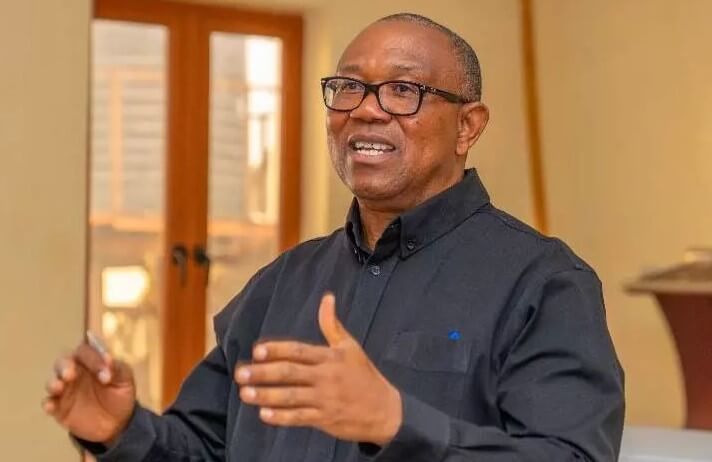Place your adverts here on InfoDig @ low rates; banner ads, sponsored links and guest articles etc. Contact us
.Says on high-level engagement to remove Nigeria from FATF gray list
The Central Bank of Nigeria (CBN), on Saturday, said it has been canvasing support from the multilateral donor agencies to strengthen its evidence-based monetary policy processes.
Olayemi Cardoso, governor of the CBN, disclosed this at a joint press conference with the Ministry of Finance after the 2024 annual meetings of the International Monetary Fund (IMF) and the World Bank in Washington D.C., the United States.
The policy-making process relies heavily on data, with members of the Monetary Policy Committee (MPC) thoroughly analysing economic indicators before reaching conclusions on rate adjustments.
“The decisions that are taken with respect to interest rates in Nigeria are primarily evidence-based. One of the things that I have been canvassing for during my past few days here is how I could get assistance from many of the donor agencies and others with respect to strengthening the evidence-based process at the Central Bank of Nigeria, because I think that is very, very key as we move along this whole road of travel,” Cardoso said, underlining the institution’s reliance on empirical data to guide monetary policy.
The call for support reflects the bank’s commitment to redefining its internal processes to better respond to economic realities. As Nigeria navigates economic challenges, a more robust evidence-based framework at the CBN is expected to bolster its ability to make informed monetary policy decisions. This, in turn, could enhance the effectiveness of interventions designed to stabilise inflation, promote growth, and foster financial stability.
The CBN governor underscores the increasing importance of data integrity and analysis in guiding national economic policy and aligning the bank’s operations with international best practices. As the CBN seeks collaboration with donor agencies, it aims to ensure that its decision-making processes are not only transparent but also continuously strengthened through strategic partnerships.
These developments mark an important step forward for the central bank, signaling both its openness to improvement and its determination to navigate Nigeria’s evolving economic landscape with precision and foresight.
He said the CBN has been on a high-level engagement to remove Nigeria from the gray list of the Financial Action Task Force (FATF) since February 2023.
FATF is the global body established in 1995 to lead global action to combat money laundering, terrorism, and proliferation financing.
The organisation had greylisted the country due to a rise in capital inflows and deficiencies in combating money laundering, terrorism, and arms financing.
The CBN governor said diaspora remittances have risen by 140 percent within six months as it targets $1 billion monthly.
He said diaspora remittances stood at $250 million in April 2024 and have increased to $600 million as of September 2024.
Cardoso said the bank has committed that by the end of this year, it will unveil a new product that will allow the non-resident diasporas to register their Bank Verification Number (BVNs) more seamlessly.
He also expressed optimism that with ongoing engagement with the diasporan, in addition to various products that the banking industry is offering, the CBN will be able to ramp up $1 billion monthly in remittance inflows.
“Through engagement with the diaspora, we believe we’ll be able to move accordingly, and again, rising from that engagement, we put our target on increasing the inflows, the remittance inflows, to $1 billion and I’m confident that we will get there monthly,” he said.
According to Cardoso, “The CBN recapitalisation policy has prompted deposit money banks to strengthen their financial positions, a process expected to result in a more robust and resilient banking sector by March 2026. The exercise is expected to support the realisation of the $1 trillion economy by 2030. In closing, allow me to reaffirm our commitment to addressing the challenges ahead, recognising that much remains to be done to fully achieve our goals.”
Wale Edun, minister of finance and coordinating minister of the economy, who jointly briefed the press alongside Cardoso, assured that the federal government is working on strategies to alleviate the current cost of living crisis, including plans to support 600,000 small-scale farmers to produce more food across the country.
“One of the items that are being focused on at this particular time is that we dutifully collect wet season harvest, which is on the way at the moment. We have diligently identified 600,000 small-scale farmers that will farm about 1 million hectares in November, planting of wheat in January and February, planting of rice to ensure that we have a good dry season harvest, which will lead to increased output of food, increased availability, and increased affordability,” Edun said.
In a brief remark, Jimoh Ibrahim, a Nigerian senator, advised the government to consider giving food vouchers to the vulnerable rather than the current cash palliatives, which have yet to alleviate hunger.
This, he said, will strengthen the naira. “If you print money, there is corruption, but if you print a voucher nobody will collect more than one voucher in a month.”

 2 hours ago
34
2 hours ago
34












)
)